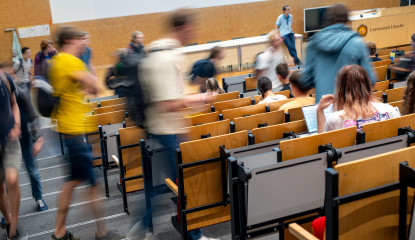Universities rebalance internationalisation
Topical

Contact

New measures instead of the mandatory non-Dutch-taught programme assessment (Toets Anderstalig Onderwijs, TAO)
Dutch universities are taking their own measures to rebalance internationalisation in higher education. They will target the intake of international students more directly and aim to make the Dutch language more prominent in bachelor’s programmes. Additionally, for selected English tracks a numerus fixus will be introduced. This approach allows universities to grow in programmes that educate students for sectors with labour market shortages. With these self-imposed measures, universities provide an alternative to the unfeasible non-Dutch-taught programme assessment (TAO), which is part of the current draft Internationalisation in Balance bill (Wet Internationalisering in Balans, WIB). A key condition for carrying out these measures is that the TAO will not apply to existing programmes.
Contact

Caspar van den Berg, president of Universities of the Netherlands (UNL): “We are taking our responsibility by expanding the offering of Dutch-taught programmes and reducing the intake of international bachelor’s students in selected large international programmes. This creates room for growth in programmes that educate students for major labour market shortages. At the same time, we are taking the specific needs of regions experiencing population decline and border areas into account.” A key condition for these university-led measures is that the Parliament removes the mandatory non-Dutch-taught programme assessment (TAO) for existing programmes from the proposed bill, limiting its application to new bachelor's programmes only. The TAO, as currently proposed is too restrictive and threatens to disrupt the diversity of academic programmes while undermining the educational, research, and labour market benefits that internationalisation provides. Moreover, the announcement of the TAO alone has already created uncertainty among current and prospective staff and students, deterring international talent that the Netherlands urgently needs.
Further measures
The measures presented go beyond the package introduced by universities in February 2024 and reflect new political and financial realities. These steps aim to rebalance internationalisation at universities, leading to a reduction of approximately 2,000 international bachelor’s students next academic year compared to the peak in 2022/2023, when nearly 19,000 enrolled.
Psychology in the Randstad to be taught in Dutch
A significant portion of psychology bachelor's programmes, including all those in the Randstad, will be offered in Dutch. Psychology programmes in border areas and regions experiencing a population decline will remain bilingual, reflecting the needs of those areas and the preferences of a majority in the Dutch Parliament (Tweede Kamer). Additionally, several bachelor’s programmes in economics and business administration will set a maximum (numerus fixus) for their English-taught tracks, with some programmes being converted to Dutch. The existing numerus fixus for psychology will remain. Universities will coordinate the maximum for both psychology and economics, aiming to manage student intake and capacity issues more effectively, while minimising any unwanted 'waterbed effects The Dutch-language versions of the programmes will remain as accessible as possible. This ensures that international student intake is manageable while also safeguarding access for Dutch-speaking students.
Improving Dutch Language Skills
The principle that international staff possess sufficient Dutch language skills when teaching in Dutch remains in place. Universities are, however, taking further steps to improve the Dutch language skills of both students and staff. To support this, universities will offer courses that enable staff to achieve a minimum proficiency level. Students will also have access to modules designed to enhance their proficiency in the Dutch language. The aim of improving Dutch language proficiency is to encourage more international graduates to remain in the Netherlands to live and work after completing their studies.
Higher stayrate
Many sectors are facing a high demand for graduate talent. Although the proportion of international students staying in the Netherlands after graduation is increasing, it remains too low. To address this, universities will help students better understand the Dutch job market and connect them with potential employers. However, success with this effort also depends on factors such as the housing market and employment conditions.
Call to Politicians: revise the WIB and remove the TAO
Universities are calling on politicians to give them space to implement these measures. These can only be put into effect if the mandatory non-Dutch-taught programme assessment for existing programmes is removed from the WIB. Van den Berg: "The TAO is far too rigid and places a heavy administrative burden on universities without improving the quality or accessibility of education. Universities can address this challenge more quickly, effectively, and in a more targeted way. Our measures are also taking the changing labour market and geopolitical tensions into account, for which the TAO criteria do not provide the necessary flexibility."

